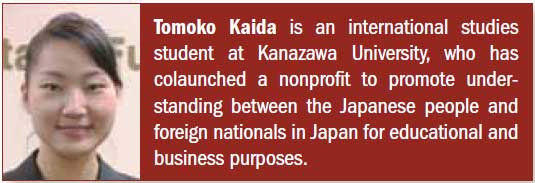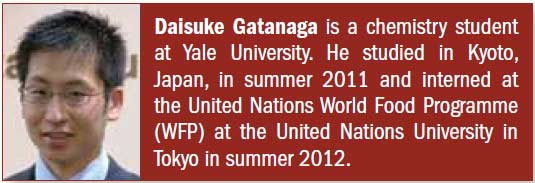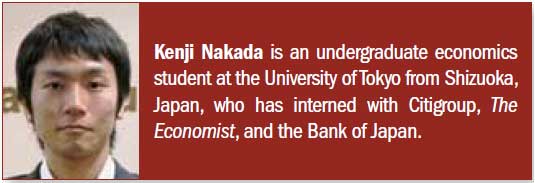Japanese Youth Speak Out
Finance & Development, December 2012, Vol. 49, No. 4
Tomoko Kaida, Daisuke Gatanaga, and Kenji Nakada
A student essay contest for Japanese university students, organized by the IMF, the Japanese Ministry of Finance, and the Bank of Japan, asked contestants to write about the global economy and the role of the IMF. The three winners were invited to participate in a Youth Dialogue panel at the 2012 IMF–World Bank Annual Meetings in Tokyo with IMF Deputy Managing Director Nemat Shafik and youth representatives from across Asia.

Being young in a time of global economic crises is extremely frustrating. You feel like an invisible observer whose interests and future are at stake, yet you cannot influence events or partake in almost any way.
Young people in developed countries feel that it is likely that they shall be deprived from opportunities their fathers and grandfathers had—while at the same time, youth in the underdeveloped and developing world disappointedly consider that their future is not going to be as bright as they expected.
I would say that this sums up the youth perspective on the current shape of the global economy.
The IMF has a clear mandate, among other things, to promote global macroeconomic stability. With its instruments, it financially stabilizes and alleviates economic conditions of states (and their citizens) and saves them from monetary failure. Accordingly, the position and responsibility of the IMF in the stabilization of the global economy is noteworthy. Yet, although there are some positive developments (such as the IMF Youth Dialogue Initiative), there is just too little “youth” in the policies and practices of the IMF. Though financial stabilization of a country generally has a positive effect on the level of employment of its population, including youth, it is just not enough, and the IMF should become much more youth sensitive.
Actually, the IMF should move forward and attach something I call National Youth Policy Conditionality (NYPC) to its lending practices. Today, when lending funds, the IMF looks for the readiness of a government to adjust policies to deal with possible problems and repay loans. The IMF’s perspective should be expanded beyond classic economic policies. Governments that expect to receive IMF support in the future should have to show what kind of youth-friendly economic policies they have (or they are going to have) and that a respective portion of loan funds received from the IMF will be invested in creation of opportunities for the youth. Extensive youth employment programs, formal education, and vocational projects, etc., should be looked at.
Additionally, it should be noted that this concept has economic logical advantages for the IMF. By attaching NYPC to its loan policies, the IMF will motivate countries to invest in the generation that (likely) will repay the loan. In that way the IMF will secure repayment, which is naturally, in the long term, in accordance with its business interest. At the same time, the youth of the loan-taking countries will have a sense of ownership and inclusion. Looking back they’ll say: “Yes, we remember, a portion of this and that IMF loan was invested in (our) future, and we believe that is legitimate debt—we actually personally benefited from it.”
To conclude, the IMF’s attempts to augment the role of the youth in tackling worrying economic issues of today are duly noted. Yet much more IMF corporate youth conscientiousness is expected, and I took the liberty of christening it IMF Global Youth Responsibility (GYR).The youth of the world are expecting it. ■

As a chemistry major at Yale, I admit I occasionally found myself too enraptured in my studies of electrons and protons to care about much else. This summer however, I stepped outside the insular world of the chemistry lab to intern at the WFP. The images that I encountered through my work there were breathtaking and alarming. In the Sahel, mothers boil otherwise inedible toxic plants, trying desperately to provide their children with meager amounts of food. In South Sudan, violence has erupted over poor harvests displacing many and leaving them with little hope or livelihood. Around the world, these food crises have been exacerbated by economic conditions, including high inflation, rising food and fuel prices, and volatile global markets.
Having lived the majority of my life relatively comfortably in developed countries such as the United States and Japan, I can hardly fathom the distress of lacking even basic subsistence. Perhaps I should even feel grateful that the worst my family suffered in the recent global economic crisis was the loss of my father’s job last year. But even that, inevitably, wrought a numbing apprehension and gloom on my family as my father faced a seemingly cold and unsympathetic job market.
I cannot profess to be able to propose groundbreaking advice to solve such economic problems. But my own experiences with the WFP and with my father’s unemployment have illuminated personally the realities of today’s global financial system and its recent financial crises. Though the reverberations of these crises differ from country to country, it seems apparent, especially in light of the 2007–08 global financial crisis, that flags were raised around the world. Given that internationalization continues to link national economies into international networks, global institutions such as the IMF must play essential roles in macroprudential supervision and in ensuring universal economic growth and financial stability. At the same time, however, it is critical that the IMF not forget—amid the objective numbers and data and calculations that go into monetary surveillance and analysis—that the economy affects real people, that there are real voices behind such statistics.
I believe the role of the IMF, then, is to be a medium through which people around the world—including young adults like me—can voice their opinions and engage in bilateral conversation. As an international monetary institution, the IMF is uniquely situated to provide such a forum, incorporating a wide range of people from a spectrum of backgrounds. Only when people feel they have a stake and a voice in the future is there hope of international cooperation and understanding, or any prospect of eliminating the deficiencies in information, communication, and transparency that spurred past economic crises. In a world that is becoming increasingly interconnected, my conviction is that the IMF provides a foundation from which we can look to the future with optimism as we strive to forge international monetary cooperation. ■

In this essay, I argue that the IMF can, with some improvements, contribute more effectively to the global economy as a platform for international dialogue. I first point out several changes in the economic environment brought by globalization. Next, I adduce a recent example of an international monetary problem in which the IMF could have played an important role, and then propose points of improvement to ensure its vigorous contribution.
Globalization brings about strong connections between economies, in which three Ds—dependence, diversity, and dispute—prevail. In a globalized world, economies are interdependent and communities diversified. Dependence and diversity often entail the other D, dispute. As became apparent in the wake of the current financial crisis, there are countless economic disputes around the world—about currency regimes, cross-border capital flows, bank regulation, current account imbalances. The new generation has to work together to settle these disputes, and I believe the key to solution is the fourth D, dialogue. International dialogue improves mutual understanding among countries, which is a basis for financial stability.
A recent dispute in which the IMF could have played an important role is about monetary policy. In response to the ongoing crisis, industrialized countries have adopted aggressive monetary policies to underpin growth. Some emerging economies claim that the overflow of money resulting from those policies is harmful to them because it induces inflation. In my opinion, monetary authorities of industrialized countries should take this complaint more seriously, since, in a globalized world, setbacks to emerging economies badly affect other economies via export channels. The IMF could have initiated international policy coordination in G20 meetings, for instance, to make monetary policies more effective in industrialized economies and at the same time less harmful to emerging economies.
The IMF is eligible for this role because it has two advantages over other international financial institutions. The first is its outstanding research capability backed by the Article IV consultations. Based on its own research, the IMF can provide consistent interpretation of economic situations and thus set a benchmark for dialogue among countries. The second advantage is the funds it has. The IMF can motivate cooperative policies by providing financial contributions and is the only existing institution that can afford such incentives. Despite these advantages, the IMF has to change. The research capability should be enhanced to tackle increasingly sophisticated problems. Furthermore, it is critically important that the IMF be regarded as truly fair and neutral so that its research and proposals are fully trusted. If these improvements are made, I believe the IMF can function better to stabilize the financial system.
The further globalization progresses, the more important the role of the IMF to facilitate international dialogue becomes. Through this role, the IMF can encourage cooperation among shareholders of the global monetary system and, by doing so, it can help economies benefit from globalization while avoiding downsides. This, I believe, will lead to financial stability and a healthier world economy. ■


